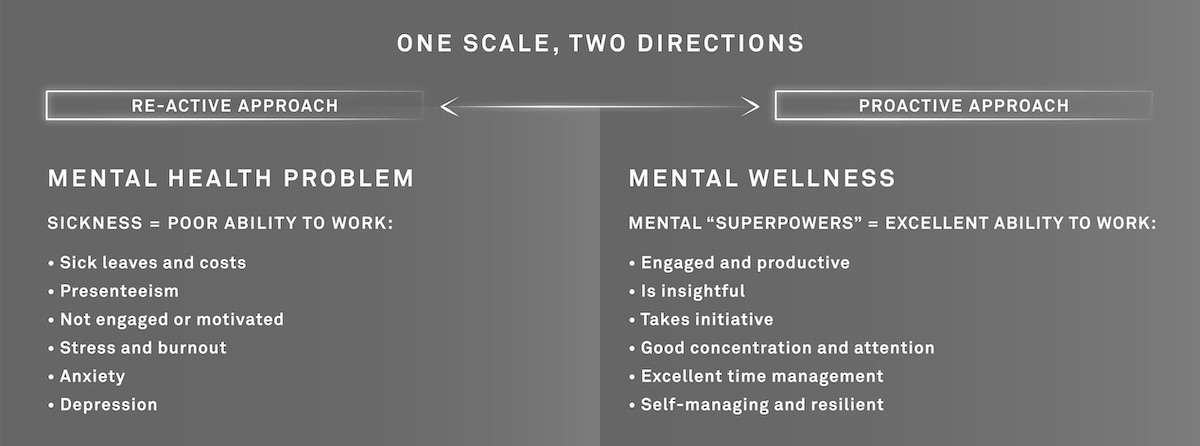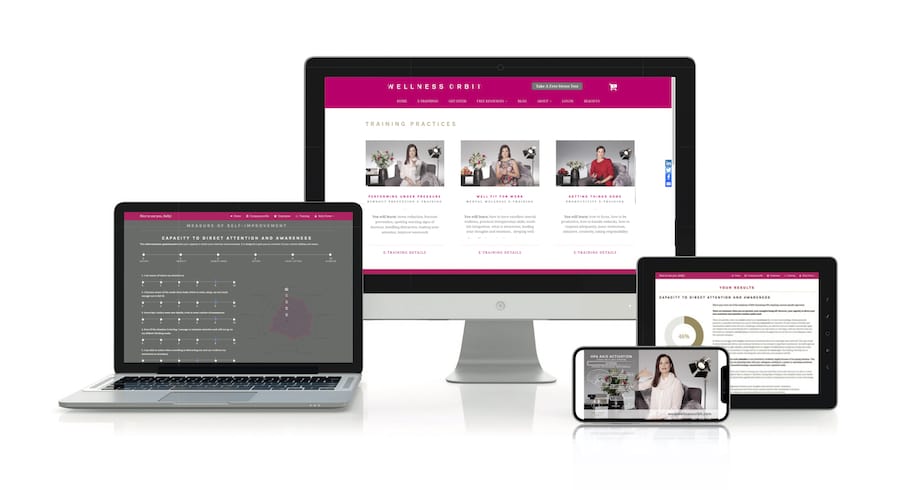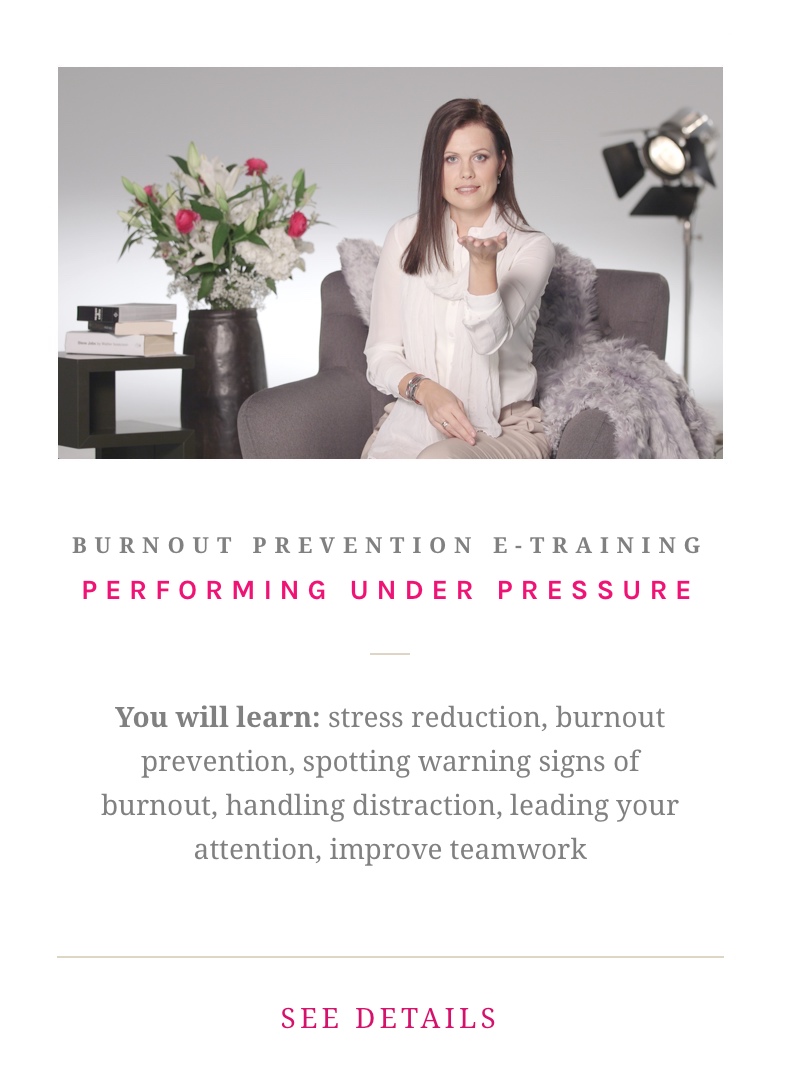Having a clear vision and setting well-defined goals and achievable milestones is a proven path to creating personal or organizational change.
Maintaining mental wellness is no different than securing excellent physical health. It demands planning, learning intrapersonal skills, and purposeful action (application of learned skills). Achieving a desired outcome requires personal initiative, keeping the focus and measuring the outcome.
In workplaces, we need to place greater emphasis on proactively safeguarding employee mental wellness.
Our main focus should be: How to secure mental wellness. This shifts our focus from merely addressing illnesses to actively promoting the overall mental wellness of all employees (see the graph below to understand how to shift our focus from the current illness-centric approach to a wellness-centric approach).

Mental wellness resources on this website allow you to set goals on an individual level, and when people apply what they learn, you see progress on the wider workplace level.
To benefit, start by defining the specific area of mental wellness that you want to improve. This could be reducing stress levels and preventing burnout, improving life-work balance, and increasing productivity or enhancing overall mental wellbeing.
Being specific about the desired outcome is what drives results, and that is why we offer different mental wellness trainings.
|
Self-evaluation as part of a mental wellness plan
Self-evaluation is a critical success factor for creating a working mental wellness action plan. While intrapersonal skills are universal, what needs your individual attention varies. That is why everyone gets a personal account and self-evaluation before and after the mental wellness training.
Knowing your situation allows you to learn best, and measuring later allows you to see what you need to improve daily.
All Wellness Orbit online trainings offer measurements of individual mental wellness progress with instant feedback (see the example of the self-evaluation tool below).

Measurement allows you to notice the progress. Practical skills allow you to make a difference.
However, it takes time and personal initiative for any current behavior to become a healthy routine that supports work and life. Adherence to your plan and correction of your habits remain keys to achieving meaningful results from mental wellness training.
Metrics can increase adherence and allow focusing attention on the improvement of your daily activity, and this leads to improved wellbeing and work results. The end goal of systematic mental wellness training is to improve individual accountability over time. For example, noticing how you respond and knowing how to keep calm requires time to become efficient practice. And when it comes, people become more present and supportive towards each other.
As your individual mental wellness levels increase, so does resiliency and overall well-being. Only mentally fit and mentally sharp people can drive successful organizational change and deal with challenges without stressing out or burning out (both problems are huge, as explained in this blog post).
Who needs to be involved in your mental wellness training plans, and why proactivity matters?
When setting organizational goals for mental wellness, you need to involve all stakeholders (including employees, managers and human resources). That is when you see great results.
Exclusively, when everyone learns and practices intrapersonal skills, it becomes possible to shift the organizational culture towards wellbeing and improved productivity.
Why it matters?
Mental health issues cause damage across positions and professions.
There are no quick fixes for mental health if you have lost it. That is why prevention is more appropriate than the cure as it allows you and your team members to stay on the right-hand side of the mental health scale from now on.
It is on the right-hand side of the graph below where you find huge mental wellness benefits.

On the left side, you find the current reactive mental health approach. On the right side are the benefits of the proactive mental wellness training application.
Only time, intention, and training your mind will allow you to achieve what you have decided in your mental wellness plan.
Securing mind health and mental wellness is about designing a proactive and sustainable inner journey to wellbeing and thriving, not short sprints and instant gratification. It is critical to replace reactivity with a proactive and systematic approach.
People with fit minds identify challenges as opportunities and don't get lost in inner reactivity that creates worry, stress, burnout, anxiousness and toxic relations.
Poor team dynamics can lead to delays, quality issues, and decreased customer satisfaction, all resulting in increased operational costs. In a 2023 Oak Engage Toxic Workplace Report of over 2,000 employees across industries, 75% of participants reported experiencing a toxic workplace culture and stated that it had an impact on their mental health and burnout risk (see the graph below).

So, by now it should be obvious that maintaining a fit mind comes down to securing excellent self-leadership, as only good intrapersonal skills lead to great interpersonal skills.
Conclusion
Just as failure to pay attention to physical health can lead to health issues, ignoring proactive mental wellness trainings you end up with negative inner reactivity, leaving people worried, stressed, or struggling mentally otherwise. Reactive people make up reactive teams, and reactive teams inevitably end up losing compared to creative teams, where personal responsibility and excellent self-leadership lead the game.
Maintaining mental wellness is easy when you train your mind and apply the intrapersonal skills you have learned.
Make sure that individuals have the necessary resources to achieve their mental wellness proactively. It truly matters as training your mind brings tenfold ROI. Remember, setting goals for mental wellness represents a continuous process that requires ongoing individual effort and organizational attention at the same time.





